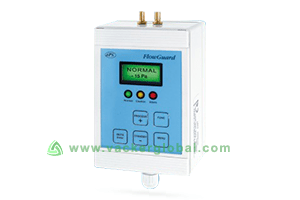
There are many commercial applications, which require a pressure difference between two rooms. We need to use differential pressure sensors for such applications. Examples are hospital rooms, pharmaceutical plants, clean rooms, isolation wards, laboratories, electronic manufacturing plants etc. Depending on the application, a room has to maintain a higher or lower pressure compared to the outside area. Technically, we call it as differential pressure. The room with higher pressure is having a positive pressure. Similarly, the room with lower pressure is at a negative pressure.
We are supplying numerous types of differential pressure sensors for such applications.
What is a Differential Pressure Sensor?
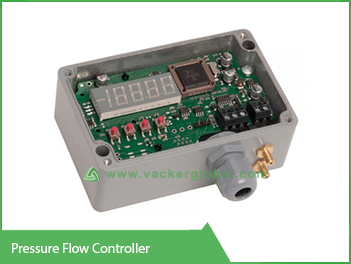
As briefed above, when there is a difference in pressure between two rooms, it is known as differential pressure. A sensor for constantly monitoring the difference in pressure is a differential pressure sensor. There is a central control unit, which takes air inputs from both the rooms. This central control unit is the major component of the differential pressure monitoring. There will be one small air pipe connected to the first room and a second air pipe to the second room. This directly represents pressure of each room. The system comprising of pressure sensors continuously monitors the pressure difference and measures the exact pressure at all times.
An absolute pressure sensor is a sensor, which measures the pressure of a single room and displays the exact pressure reading. A basic differential pressure sensor consists of two absolute pressure sensors. Normally, the control unit will be capable of displaying the exact pressure readings of both the rooms as well as the difference in readings.
Differential pressure measurement is applicable for air, gas, liquid etc. All of them have the basic principle of measuring the pressure between two points.
Negative Pressure Sensor
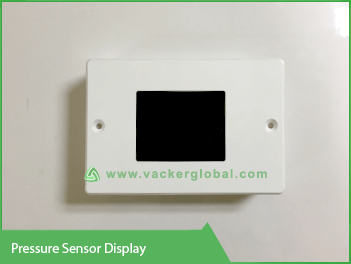
While mentioning about negative pressure, it is generally lower pressure than atmospheric pressure. Also it can be lower pressure compared to an adjacent room. In all these cases, it is basically difference in pressure.
As an example, if you have a warehouse with huge exhaust fans it is removing air from the warehouse. If you do not have proper air intake systems the pressure inside the warehouse will become negative. Hence, you should have air intake systems which brings fresh air at the same rate as removal of air. And, both the systems should work simultaneously. If the exhaust fan is not working, the air intake system also should stop simultaneously. Otherwise, the higher intake will generate a positive pressure inside the warehouse.
A negative pressure sensor constantly checks whether the pressure is becoming negative.
Positive Pressure Sensor
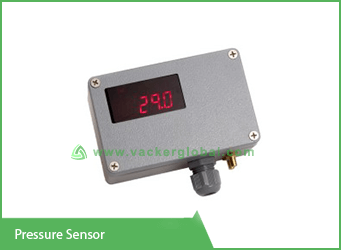
Positive pressure and negative pressure sensors are two elements of the same differential pressure monitoring system. In the above example, you need to ensure that the pressure does not become positive nor negative.
In this case, you do not need a separate positive pressure sensor and another negative pressure sensor. You will require one room pressure monitoring system having two air pipes. One pipe will be positioned inside the warehouse and the second one outside the warehouse. We can program the same to ensure that the inside pressure is always same as outside pressure.
Room pressure monitoring for hospitals
In hospitals, there are lot of critical areas such as operation theaters, isolation wards, critical care units, laboratories etc. We need to maintain pressure difference for such rooms. This require continuous room pressure monitoring systems.
Major use in hospitals is for isolation wards, which maintain a slightly lower pressure than the surrounding rooms. As this room has a lower pressure, contaminated room will not go out of the room. This will mainly prevent spread of airborne diseases. Air will flow from the outside into this room, but not reverse.
As this is a very critical requirement, our reliable negative room pressure monitoring can be installed for this purpose. We will install one air pipe in the isolated room and another one outside this room. This monitors that the isolated room always have a negative pressure.
Similarly, there are positive pressure rooms in hospitals which will provide a clean environment. These rooms are for sterile equipment, for patients of low body resistance etc. In this case we use the term positive room pressure monitoring system.
Also, all the Central sterile supply department (CSSD) areas in hospitals will require differential pressure monitoring systems.
Features of our Room pressure monitoring system model 6000
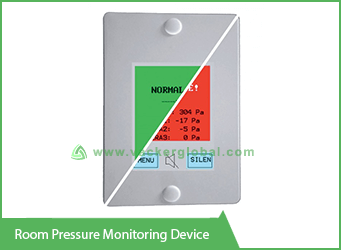
We supply our model 6000 room pressure monitoring system for all commercial applications. You can use the same system for negative pressure monitoring and positive pressure monitoring. You can always adjust the desired pressure level in the configuration. This way you don’t have to worry about the pressure reading before installation. After the installation, you can configure as required by you.
Major features of the system are explained below:
- One device can monitor up to 4 rooms simultaneously. Also, you can expand the same system using additional sub units.
- It uses sealed membrane capacitive measurement technology for better accuracy. This will prevent any air particles or dust from escaping from one room to another.
- The system can generate alerts if the programmed pressure is not maintained.
- If you require monitoring on your computer through your local area network, same is possible. Also, the system can work as a standalone unit without connecting to a centralized network.
- We can connect an external alarm to a nursing station or another remote room. Also, customer can connect a SIM card based phone call and SMS alert system. In this case, it will generate phone calls to 4 operators in case of an alert.
- The system will display green if everything is OK. In case of an alert, it will display red on the screen.
- The customer can mount on the surface of the wall. Alternatively, customer can flush mount the same after making a cavity.
- The display screen is touch screen having dimension of 65 x 50mm.
- We can connect many devices together to a network through Modbus protocol.
- The measurement unit is Pascal.
- The room pressure monitoring system has an accuracy of 0.5 Pa.
- The dimension of the unit is 150x100x5 mm.
- We can connect one analog output of the monitoring system to a VAV system for controlling the air flow.
